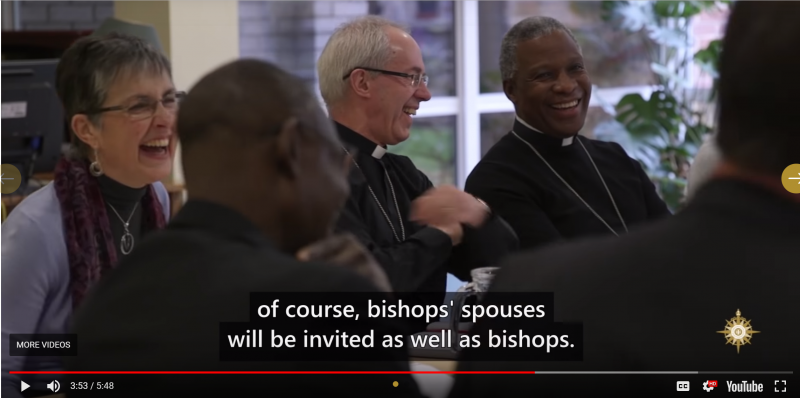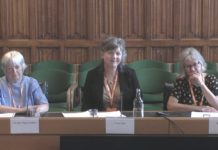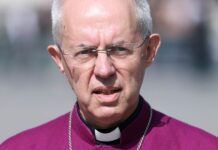When the boundary markers of biblical and apostolic faith are set aside, confusion enters the Church.
The Secretary General of the Anglican Consultative Council has recently issued a statement about Lambeth 2020 to address what is described as:
‘a misunderstanding that has emerged in some online blogs’ and announces that that ‘it would be inappropriate for same-sex spouses to be invited to the conference.’
However, to suggest there has been a ‘misunderstanding’ looks like an attempt to deflect attention from the facts. The Archbishop of Canterbury has changed the long-established convention that spouses are invited to Lambeth Conferences and contradicted the blanket statement he made in a recent video when he affirmed “of course, bishops’ spouses will be invited as well as bishops.”

The reason for this change in policy follows from another, which was to include for the first time at Lambeth 2020 same-sex partnered bishops in contrast to the policy of his predecessor, Archbishop Rowan Williams, who did not invite Bishop Gene Robinson and his same-sex partner to Lambeth 2008.
The depth of theological confusion is revealed by the fact that Dr Idowu-Fearon defends the decision to disinvite spouses in same-sex marriages on the grounds that such relationships are contrary to Lambeth Resolution I.10, while at the same time making it clear that the bishops who have contracted such unions will be invited.
On what possible moral or Scriptural grounds can such discrimination be practiced? The bishops who are being invited share the same lifestyle and the same beliefs about marriage as their spouses. And it is surely wrong to imply that their presence is somehow less of a problem than that of their spouses when, as supposed guardians of the faith, they are flouting the teaching of their Communion in one of the most personal ways possible.
Basic consistency clearly means that both partners should be invited or neither, and this is recognized on both sides of the argument. For example, Canon Jeremy Pemberton, a Church of England priest married to his same-sex partner, has commented “There is no sense to it. The basic problem is they don’t understand hospitality. The same-sex partners should be invited…it is not complicated.”
However, biblical consistency must go further. It does not focus simply on the lifestyle adopted, but is concerned with the bishops’ role as a guardian and a teacher of the faith. The only consistent way to uphold the teaching of the 1998 Lambeth Conference Resolution I.10 is to go beyond questions about individuals’ behaviour to focus on teaching, which is the position set out in Gafcon’s ‘Letter to the Churches’ of June 2018.
The ones who should be disinvited are those who fail to uphold the biblical standard, in word or deed, while those who do uphold it, but have not been invited, should be included. Instead, we have a token acknowledgment of Lambeth I.10 which is shamelessly used to exclude a few same-sex spouses while bishops from five provinces which have formally recognized such same-sex marriages are welcomed.
As the boundary markers of apostolic faith are being progressively removed, the need for the godly order which Gafcon brings, based on the doctrinal standard of the Jerusalem Statement and Declaration, becomes ever more necessary if the Anglican Communion is to fulfil its great purpose of giving clear and certain witness to Jesus Christ.




Frankly, I was almost shocked that Justin Welby would be so blatantly hypocritical and, apparently, racist.
In the first instance, as pointed out by this release from Gafcon (I assume Archbishop Ben Kwashi, as it is attributed to the Gafcon Secretariat), in what way is the moral or religious character of the gay bishops so superior to that of their spouses that the spouses are to be refused, but the bishops welcomed? If anything, it should be the other way around. Why would the spouse be subject to Lambeth 1.10 but not the bishop? In point of fact, of course, according to Lambeth 1.10, the now bishops should not have been ordained as priests (much less bishops) in the first place. For that matter, these bishops could not currently be consecrated even in the revisionist dioceses of the Church of England.
As to racism, Welby is clearly of the opinion that African and Asian and South American bishops are so stupid that they would fall for this obvious misdirection. Can anyone imagine that there is a GS bishop now saying “Oh, Welby has boldly stood for orthodoxy by barring gay spouses from the meeting, so now I will go and chat with my British and American colleagues on the best ways to introduce gay marriage and transgender affirmation liturgies to my diocese!” I cannot imagine that this cheap trick will change a single mind in the GS. Bishops will either not attend on principle or they will attend and do their best to get something positive from the conference while avoiding the numerous revisionist indoctrination sessions.
This sort of misdirection is a commonly used tactic in the “small table discussion” “Euro-American indaba” “listening process” techniques that Welby uses in his “good disagreement” sessions. Essentially, he is trying to move the goal post by redefining the “focus” of the argument away from gay marriage and his own failure to keep his word on disciplining errant provinces. He wants the argument to be about the spouses. He wants conservatives to think he has made some concession to them, when in fact what he has done is what Williams before him did not dare to do- he is inviting every gay bishop he can find.
So, I am left thinking that this suggestion must have come, not from the Global South, or Gafcon. “We will not come if you invite the gay spouses” likely came from what Welby thought were sure attendees. That is to say, the nominally conservative members of WESTERN liberal provinces. It was not done to convince Nigeria to come, it was done to get all the Australian, Irish and perhaps even CoE bishops to show up.
As things stand now, it has already been announced that the pro-gay faction of the CoE will be hosting any and all gay spouses, no doubt in much grander style than the college dorm rooms that the bishops are paying 5000 pounds sterling to stay in. So, they will all be nearby and available to the press.
Welby is the Captain of a sinking ship TJ. With the departure from the CofE last week of the Rev Dr Peter Sanlon , the first “big name” clergyman has now gone and is the first domino to fall. Others will follow what will now become a chain of clergy leaving.
For those of us actively seeking pastures new, we patiently wait while prayerfully discerning our steps, but the mass exodus is beginning.
I wonder what Welby will call the liberal anti gospel organisation he is left with? A Church is certainly something that it won’t be…